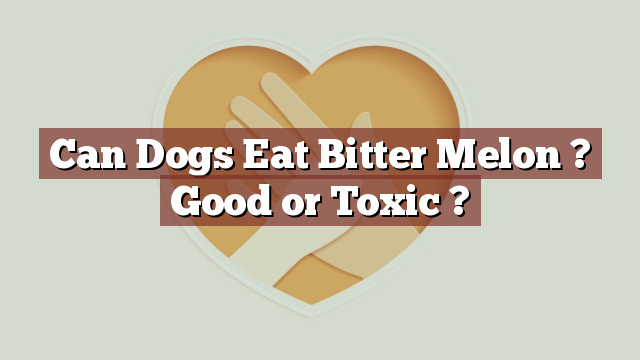Can Dogs Eat Bitter Melon? Good or Toxic?
When it comes to our canine companions, ensuring their health and safety is of paramount importance. We must carefully assess the foods we offer them to guarantee they are both delicious and safe. Bitter melon, a tropical fruit known for its bitter taste, is a prime example of a food that requires scrutiny. Let’s delve into the nutritional value, safety, potential risks or benefits, and actions to take if your dog consumes bitter melon.
Nutritional Value of Bitter Melon: Vitamins, Minerals, and Fiber
Bitter melon is a fruit that boasts an array of essential nutrients, making it a popular choice for human consumption. It is rich in vitamins such as vitamin A, vitamin C, and vitamin B6, all of which contribute to a strong immune system and overall well-being. Additionally, bitter melon contains essential minerals like potassium, magnesium, and iron, which aid in various bodily functions. Furthermore, it is a great source of dietary fiber, promoting healthy digestion in humans.
Can Dogs Eat Bitter Melon? Evaluating Safety and Toxicity
Can dogs eat bitter melon? Unfortunately, the answer is no. Bitter melon can be toxic to dogs and should be avoided. While it may offer health benefits for humans, it can have adverse effects on our furry friends. The compounds present in bitter melon can cause digestive distress and even lead to more severe complications in dogs. It is essential to prioritize their well-being by refraining from feeding them this particular fruit.
Potential Risks or Benefits of Feeding Bitter Melon to Dogs
Feeding bitter melon to dogs can pose significant risks to their health. The compounds responsible for its bitter taste, such as momordicin, charantin, and vicine, can lead to gastrointestinal issues, including stomach upset, diarrhea, and vomiting. Moreover, these compounds have been associated with a decrease in blood sugar levels, which can be dangerous for dogs, especially those with underlying health conditions like diabetes. Considering these risks, it is best to avoid introducing bitter melon into their diet.
What to Do if Your Dog Eats Bitter Melon: Symptoms and Actions
If you suspect that your dog has consumed bitter melon, it is crucial to monitor their behavior and watch for any symptoms of distress. These may include vomiting, diarrhea, abdominal pain, excessive drooling, or decreased appetite. If these symptoms occur, it is recommended to seek immediate veterinary assistance. A professional will be able to provide appropriate guidance and treatment tailored to your dog’s specific needs.
Conclusion: Bitter Melon for Dogs – Proceed with Caution
In conclusion, bitter melon is not suitable for our canine companions. While it may offer nutritional benefits for humans, it can be toxic to dogs, leading to digestive issues and potential complications. It is essential to prioritize their well-being by refraining from feeding them this fruit. Instead, opt for alternative fruits and vegetables that are safe and beneficial for their health. Remember, consulting with a veterinarian is always a wise choice when it comes to introducing new foods into your dog’s diet.
Thank you for investing your time in exploring [page_title] on Can-Eat.org. Our goal is to provide readers like you with thorough and reliable information about various dietary topics. Each article, including [page_title], stems from diligent research and a passion for understanding the nuances of our food choices. We believe that knowledge is a vital step towards making informed and healthy decisions. However, while "[page_title]" sheds light on its specific topic, it's crucial to remember that everyone's body reacts differently to foods and dietary changes. What might be beneficial for one person could have different effects on another. Before you consider integrating suggestions or insights from "[page_title]" into your diet, it's always wise to consult with a nutritionist or healthcare professional. Their specialized knowledge ensures that you're making choices best suited to your individual health needs. As you navigate [page_title], be mindful of potential allergies, intolerances, or unique dietary requirements you may have. No singular article can capture the vast diversity of human health, and individualized guidance is invaluable. The content provided in [page_title] serves as a general guide. It is not, by any means, a substitute for personalized medical or nutritional advice. Your health should always be the top priority, and professional guidance is the best path forward. In your journey towards a balanced and nutritious lifestyle, we hope that [page_title] serves as a helpful stepping stone. Remember, informed decisions lead to healthier outcomes. Thank you for trusting Can-Eat.org. Continue exploring, learning, and prioritizing your health. Cheers to a well-informed and healthier future!

